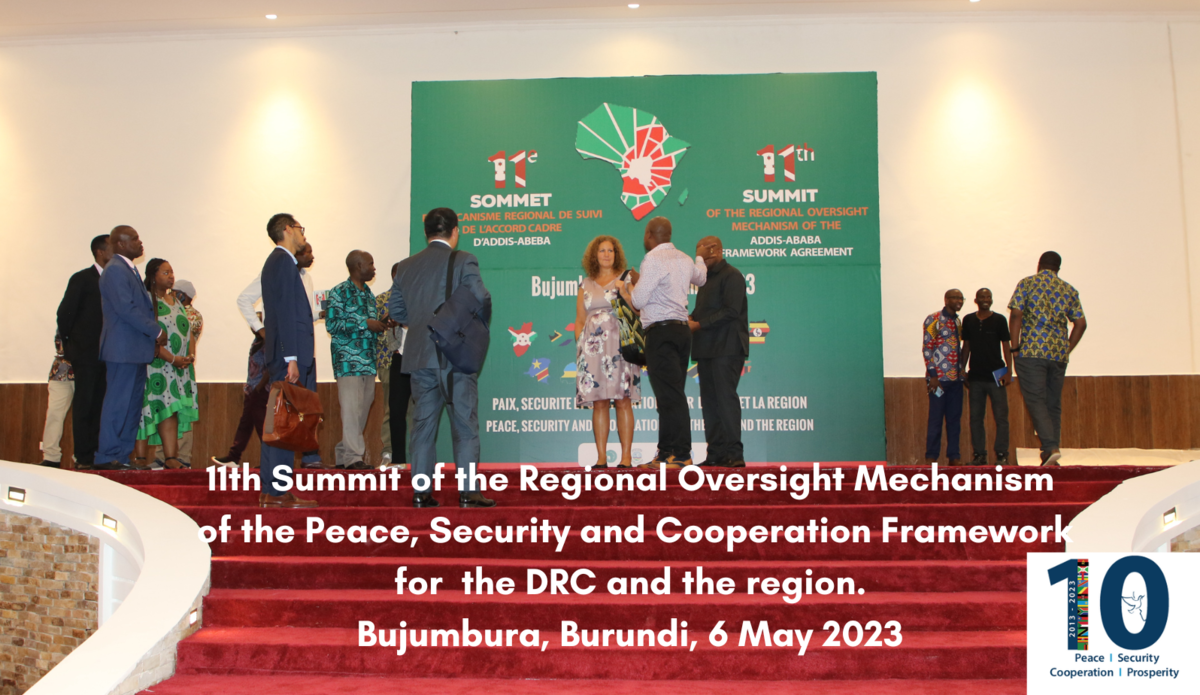NOTE TO THE MEDIA
WHAT
11th meeting of the Regional Oversight Mechanism of the Peace, Security and Cooperation Framework for the Democratic Republic of the Congo and the region
On 6 May 2023, the Republic of Burundi will host the 11th high-level meeting of the Regional Oversight Mechanism of the Peace, Security and Cooperation Framework for the Democratic Republic of the Congo (DRC) and the region in Bujumbura. The meeting is organized with the support of the Guarantor institutions of the Framework agreement, namely the United Nations (UN), the African Union (AU), the International Conference on the Great Lakes Region (ICGLR), and the Southern African Development Community (SADC).
The meeting will review progress and challenges in the implementation of the commitments under the Framework signed in Addis Ababa, Ethiopia, on 24 February 2013. The meeting will also focus on the full implementation of the decisions made in the Nairobi and Luanda peace processes, as well as the harmonization of both processes.
The meeting will also discuss the contribution of the Contact and Coordination Group on Non-Military Measures to efforts aimed at strengthening security cooperation for the eradication of armed groups in eastern DRC. The meeting will also consider a draft roadmap for the revitalization of the Framework Agreement with a view to giving it a new impetus in order to respond more effectively to peace and security concerns in the region.
The meeting will make a special mention of the implementation of the Action Plan (2021-2023) of the UN Strategy for Peace Consolidation, Conflict Prevention and Conflict Resolution in the Great Lakes region (2020-2030). The Strategy aims to support the countries and peoples of the region in their efforts for lasting peace, security and development.
At the end of this high-level meeting, the President of the Republic of Burundi, H.E. Évariste Ndayishimiye, will assume the Presidency of the Regional Oversight Mechanism of the Peace, Security and Cooperation Framework for one year, succeeding the President of the Democratic Republic of the Congo, H.E. Félix Antoine Tshisekedi. A communiqué by the Heads of State and Government of the signatory countries of the Framework will be issued.
It is worth noting that this high-level meeting is being held within the framework of the 10th anniversary of the signing of the Peace, Security and Cooperation Framework.
WHO
Participants expected at this event include several Heads of State and Government from the signatory countries of the Framework agreement; and high representatives of the Guarantor institutions of the Framework, namely the AU, UN, ICGLR and SADC. The UN will be represented at the highest level by Secretary-General António Guterres. Many observers from the international community, particularly from the diplomatic corps, will be present. The Advisory Board for Women, Peace and Security in the Great Lakes region will also be represented at the opening ceremony.
WHERE
Presidency of the Republic of Burundi
WHEN
Saturday, 6 May 2023
________________________________________
More information
The Regional Oversight Mechanism is the main oversight body under the Peace, Security and Cooperation Framework for the DRC and the region. It meets once a year at Head of State and Government level to review progress in the implementation of national and regional commitments under the Framework signed in Addis Ababa, Ethiopia, on 24 February 2013. The Framework agreement was signed by 13 countries and four Guarantor institutions, including the UN, AU, ICGLR and SADC, to end the recurring cycles of conflicts in eastern DRC. The 13 signatory countries of the Framework agreement are: Angola, Burundi, Central African Republic, Democratic Republic of the Congo, Republic of Congo, Kenya, Rwanda, South Africa, Sudan, South Sudan, Tanzania, Uganda, and Zambia.
On 22 October 2020, Secretary-General António Guterres approved the UN Strategy for Peace Consolidation, Conflict Prevention and Conflict Resolution in the Great Lakes region. The Strategy proposes an integrated, forward-leaning approach that aims to better leverage the political, operational, and programmatic expertise of the UN in support of a peaceful, inclusive, prosperous, and resilient region. It advocates for a shift in narrative beyond the traditional focus on conflict-related challenges to emphasize opportunities for peace, security, and people-centered development. The Strategy has 10 priorities structured around three pillars, which are to guide UN engagement in the region in line with the 2030 Agenda for Sustainable Development, while also informing specific and immediate priority actions in the period from 2020-2023.
 UN
UN
